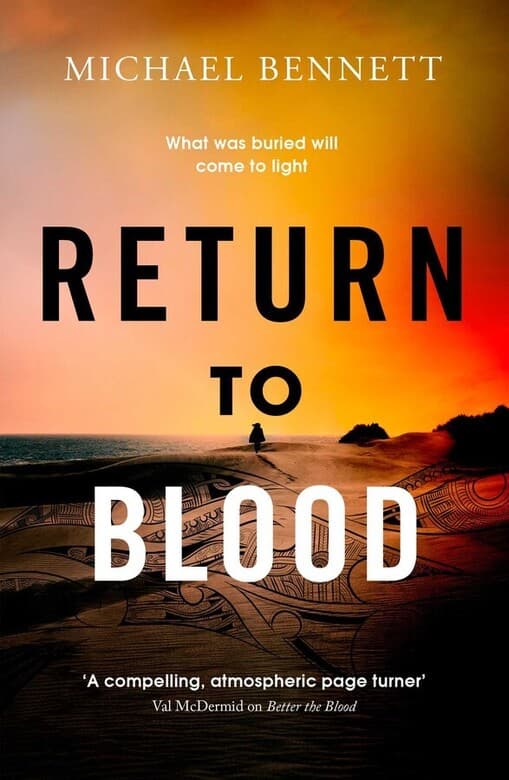Review — Return to Blood, by Michael Bennett
Reviewed by Greg Fleming
Bennett’s sequel to his breakout crime fiction debut Better the Blood opens with Hana Westerman, the ambitious detective who cornered a serial killer, taking a dawn dip in the sea. A moment of tranquillity that is soon broken when her teenage daughter discovers a body in the nearby sand dunes.
Hana’s life has changed since Better the Blood. Following the traumatic events of her last investigation, she has resigned from the police and moved from Tāmaki Makaurau back to her small-town home, Tata Bay, on the West Coast of the North Island, partly to be near her ageing father.
It turns out this is not the first body to be discovered in the dunes. The remains of a schoolgirl acquaintance of Hana’s were also found here 21 years before. The case is ostensibly closed and the killer long dead. Or are they?
Bennett’s debut was a terrific read and the resounding international acclaim fully deserved.
Better the Blood had an outsized villain with political aims, who essentially held whole cities hostage. Here the plot is dialled down a little which allows Bennett to tackle multiple storylines, some only tangentially related to the murders. These include her nephew who she’s teaching to drive (“a drivers' licence is much more than a licence. It's a passport to employment, to qualifications; to a life.”); a police colleague who’s dealing with injuries sustained in Hana’s last case; Hana’s father, Eru, who has his own health issues; the ongoing relationship between Hana’s rapper daughter and her non-binary partner PLUS 1; and the fallout from a moment of weakness concerning her ex. Then there’s the tension between Hana’s cousin, who has remained in Tata Bay and feels that Hana, with her Big City success, looks down on others in her own community.
This much material may trip up some writers, yet Bennett is up to the task. His deep understanding of marginalised communities, family tensions and the travails of our justice system enrich the novel. Ironically by focussing on local issues, he broadens the appeal to international readers (and there will be plenty of them), who are catered to here with frequent footnotes explaining Māori customs and language.
The result is a more confident novel than his debut. Return to Blood shows a writer in full command of his material and which reaches deeper into our shared human experience. It also has a surprise ending few readers will be able to predict.
The novel opens with the voice of a dead girl, a drug user and sometime sex worker (“Every guy has the same look on his face when they first see me: a cross between a frightened little boy and a jackal that hasn’t eaten meat for a week”) who had vanished from the Auckland streets five years before. It’s a ghost voice that returns at key points in the novel. Her poetic passages - which speak of a talent cruelly taken away - refocuses the reader on the victim, much like Jacqueline Bublitz did in her excellent Kiwi crime debut Before You Knew My Name.
It’s not the only point in the novel where Bennett delves into dreams, Māori myths and premonitions - throughout there are wonderful descriptions of our whenua and its difficult history.
Bennett cites the passing of his friend and mentor Ngamaru Raerino in the acknowledgments - a man who, he says, pushed him to tell stories with “integrity and authenticity and manaakitanga”. Return to Blood does exactly that.
Reviewed by Greg Fleming.
